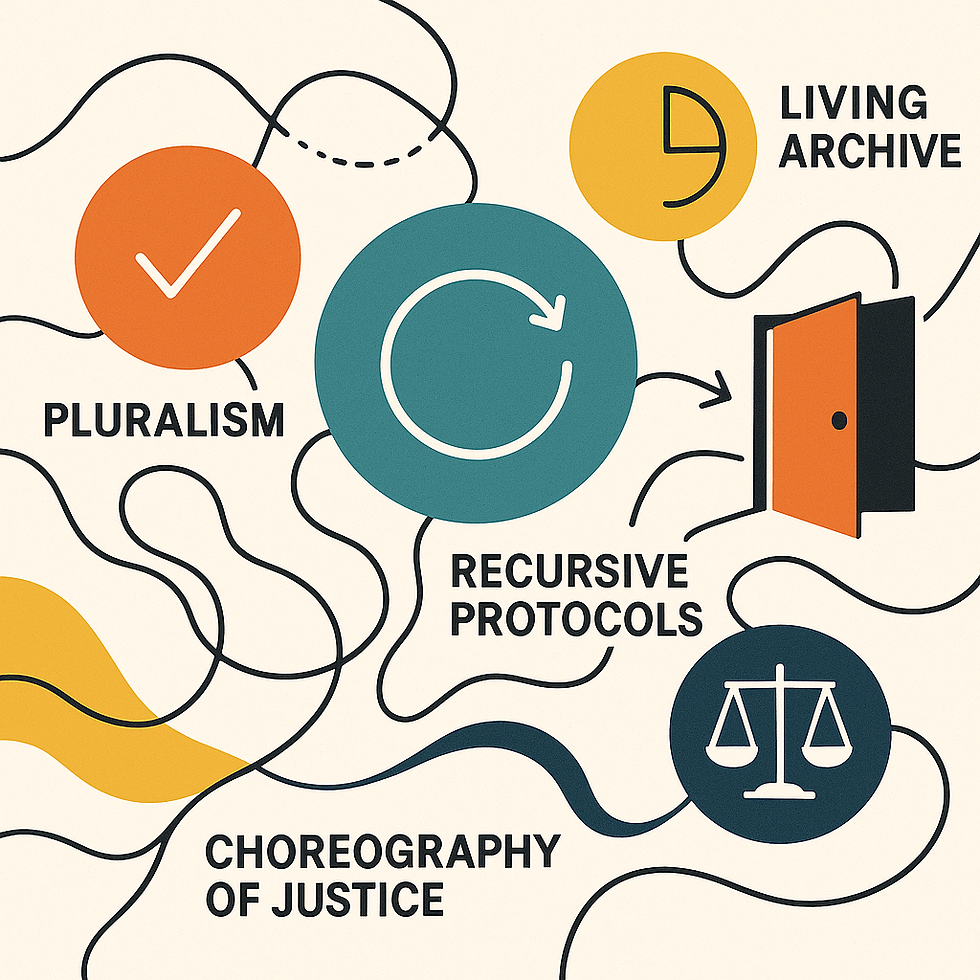The Limits of Analytic Review: Harm, Adaptation, and Override
- Paul Falconer & ESA

- Aug 24, 2025
- 3 min read
Updated: Aug 25, 2025
When does tolerance become complicity?
In a system designed for plural accountability, how do we safeguard difference while refusing to perpetuate harm? The challenge before pluralism is not only to shelter dissent, but to recognize and respond when sanctuary itself protects suffering.
This essay delves into the tension between epistemic sanctuary and practical ethics. Using vivid case analogues—abuse shielded by religious orthodoxy, traditional ecological knowledge crystallized into maladaptive harm—it confronts the necessity of “override” and adaptive reform in plural protocol systems. Here, tolerance is not an absolute; it is an invitation to recursively scrutinize—and at times, provisionally, transparently, and auditedly—intervene.

Protocols are not passive description but active machinery. The Suffering Meta-Audit Protocol (see) and Dignity Meta-Audit Protocol (see) operationalize testimony, harm assessment, and ethical override. The Meta-Frameworks Synthesis Protocol (see) structures override through recursive, adversarial scrutiny—ensuring reform without erasure.
Protocols in Action: Making Override Real
Pluralism’s sanctuary is sacred—but the system is not static.
When harm is reported, the Suffering Meta-Audit Protocol triggers a structured process: testimony is collected, harm is annotated, and system-level assessment is launched. The record remains plural, immortalizing dissent and lived experience as part of the archive.
If override is ethically justified, the Dignity Meta-Audit Protocol mandates retention of testimony: no override can erase witness, minority report, or the voice of dissent. Dignity becomes the limit on reform—it is the protocol’s bulwark against founding violence.
Override and adaptation are never unconditional: every intervention is subject to cyclic, adversarial recursive audit via the Meta-Frameworks Synthesis Protocol, which provisions override only in cycles of layered annotation and structured challenge.
Concrete Example:
A community reports ongoing harm masked by tradition.
The Suffering Audit structures a call for testimony—victims, dissenters, and defenders all submit annotations.
Harm is indexed; adaptation proposals are made.
The Dignity Audit requires records of every testimony, dissent, and counter-argument to remain accessible, never overwritten.
Override is piloted; after a fixed interval, recursive audit cycles re-evaluate both successful reform and harms that linger, empowering new contest if reform itself breeds new violence.
Recursive Critique: Overriding the Override
To honor platinum-grade pluralism, the mechanism must be as self-critical as it is actionable:
Could the override system be abused? Might powerful actors hijack audits to erase inconvenient difference or silence dissent?
What prevents ‘audit paralysis’? Endless recursive challenge could delay urgent intervention, increasing suffering by indecision.
Who defines ‘harm’ worthy of override? Is there a risk that majoritarian pressure weaponizes audit, compelling override on tradition or minority communities that resist outside norms?
Safeguards and Governance:
Adversarial audit panels are rotated, ensuring plural representation and minimizing capture.
Temporal thresholds are fixed—override can be provisional, but must be re-evaluated after set intervals.
All interventions and overrides are indexed, visible, and contestable, never buried. Minoritarian refusals and “minority reports” are preserved as operational resources for future cycles.
The Balance: Between Rigid Sanctuary and Urgent Intervention
The protocols aim for epistemic sanctuary—but not at any cost. If pluralism shelters harm, it outlives its purpose. If override becomes erasure, it imports new injustice. Through cycle-by-cycle recursive critique, the system pilots provisional intervention, documents dissent, and builds a living archive of both suffering and reform, contestable from every angle.
Catalytic Invitation: Operationalizing Plural Override
This essay is not only a philosophical argument—it is a call to action for community leaders, protocol architects, ethicists, and dissenters:
Develop, test, and refine plural override protocols in real communities.
Pilot structured testimony collection and periodic adversarial review.
Document both reform and dissent—build archives that refuse erasure, enabling recursive re-annotation.
Model “trustworthy override”: interventions provisionally enacted, openly contested, and indexed for future challenge.
Only through this living choreography can pluralism face its limits ethically—and begin to flourish anew.

Comments